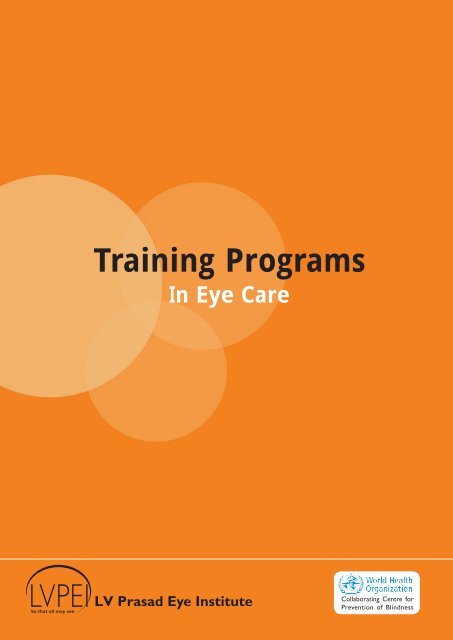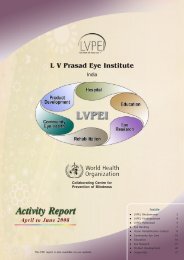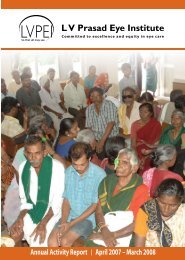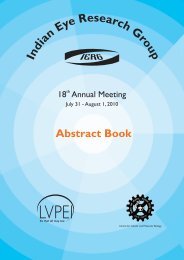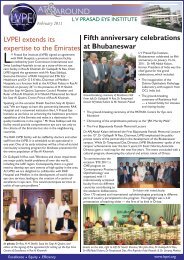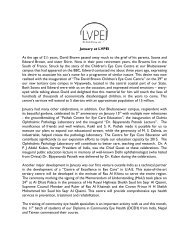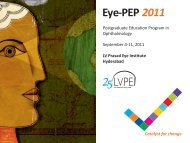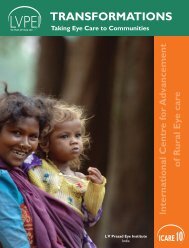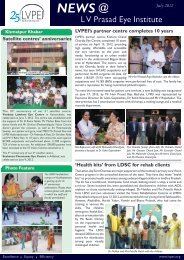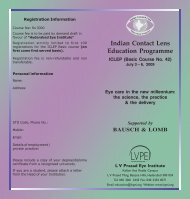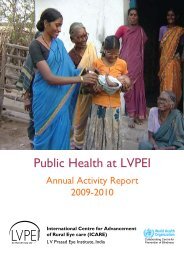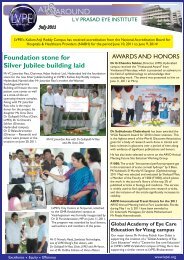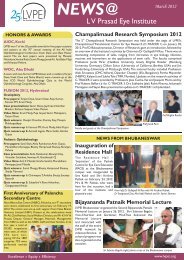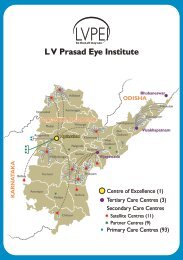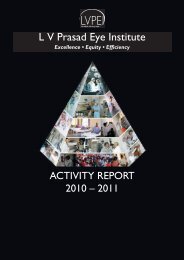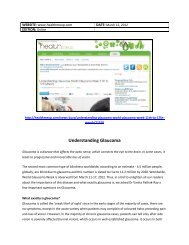Training Programs - LV Prasad Eye Institute
Training Programs - LV Prasad Eye Institute
Training Programs - LV Prasad Eye Institute
You also want an ePaper? Increase the reach of your titles
YUMPU automatically turns print PDFs into web optimized ePapers that Google loves.
<strong>Training</strong> <strong>Programs</strong><br />
In <strong>Eye</strong> Care<br />
L V <strong>Prasad</strong> <strong>Eye</strong> <strong>Institute</strong><br />
Collaborating Centre for<br />
Prevention of Blindness
L V <strong>Prasad</strong> <strong>Eye</strong> <strong>Institute</strong><br />
Kallam Anji Reddy Campus<br />
L V <strong>Prasad</strong> Marg, Banjara Hills<br />
Hyderabad 500 034, India<br />
Vision<br />
To create excellent and equitable eye care systems that<br />
reach all those in need.<br />
L V <strong>Prasad</strong> <strong>Eye</strong> <strong>Institute</strong><br />
G M R Varalakshmi Campus<br />
Hanumanthawaka Junction<br />
Visakhapatnam 530 040<br />
Andhra Pradesh, India<br />
Mission<br />
The mission of L V <strong>Prasad</strong> <strong>Eye</strong> <strong>Institute</strong> is to be a center of<br />
excellence in eye care services, basic and clinical research<br />
into eye diseases and vision-threatening conditions,<br />
training, product development, and rehabilitation for<br />
those with incurable visual disability; with a focus on<br />
extending equitable and efficient eye care services to<br />
underserved populations in the developing world.<br />
L V <strong>Prasad</strong> <strong>Eye</strong> <strong>Institute</strong>’s mission to eliminate needless<br />
blindness has led to a major focus on the development<br />
of human resources. The education programs at <strong>LV</strong>PEI’s<br />
tertiary centres in Hyderabad, Bhubaneswar and<br />
Visakhapatnam address all levels of teaching and training<br />
of ophthalmologists, paramedical ophthalmic assistants,<br />
outreach workers and healthcare managers.<br />
L V <strong>Prasad</strong> <strong>Eye</strong> <strong>Institute</strong><br />
Patia<br />
Bhubaneswar 751 024<br />
Orissa, India<br />
1
Introduction<br />
Blindness and visual impairment is a global health problem,<br />
affecting more than 161 million people worldwide in 2002<br />
(World Health Organization). About 45 million Indians are<br />
visually impaired. Nearly 75 percent of this visual impairment<br />
is avoidable, i.e., it can be prevented, treated or managed with<br />
highly cost-effective interventions. Visual impairment has a<br />
significant economic impact and generates high levels of social<br />
and economic dependency.<br />
Across the world, there is a wide disparity in the distribution<br />
and availability of human resources to address eye care needs<br />
at different levels of service delivery. In some countries and<br />
within some regions, there are fewer ophthalmologists per<br />
population unit than is considered optimum by WHO standards.<br />
In other areas, there is a virtual absence of other cadres of eye<br />
care workers—optometrists and opticians, nurses and nursing<br />
aides and technicians. Even in countries where the numbers<br />
are adequate, they are restricted mainly to urban centers,<br />
with practically no expertise or service available in rural areas.<br />
Therefore, there is a need for human resource development not<br />
only to ensure appropriate care of the most complicated cases<br />
but also to ensure effective eye care delivery to the remotest<br />
rural areas.<br />
L V <strong>Prasad</strong> <strong>Eye</strong> <strong>Institute</strong> (<strong>LV</strong>PEI) was established in 1987 with<br />
a simple aim: to bring world-class eye care to people in India,<br />
regardless of their ability to pay. Its first campus now known as<br />
Kallam Anji Reddy campus in recognition of one of its largest<br />
donors, is located in Hyderabad. It was started as a tertiary center<br />
providing specialty eye care. <strong>LV</strong>PEI now has two more tertiary eye<br />
care centres, in Visakhapatnam in northeastern Andhra Pradesh<br />
and in Bhubaneswar, Orissa. All three campuses are equipped<br />
to handle all major subspecialties. To ensure effective eye care<br />
delivery to the remotest rural areas <strong>LV</strong>PEI has built a network of<br />
primary care centers, the Vision Centres, serving rural population<br />
clusters of 50,000, which are linked to secondary care service<br />
centres in the rural areas. These refer the more complex cases<br />
to the tertiary facilities. This pyramidal model of eye care delivery<br />
has been adopted by the Indian Government in planning eye<br />
care services in its current Five-Year Plan.<br />
<strong>LV</strong>PEI and its network have, over the past two decades, seen over<br />
6 million patients in its clinics and performed close to 560,000<br />
eye surgeries of all types. Over 52% of these services have been<br />
totally free of cost to those less privileged. It is now recognised<br />
as the leading eye care centre for provision of comprehensive,<br />
high quality eye care services in this part of the world.<br />
The <strong>LV</strong>PEI <strong>Eye</strong> Health Pyramid<br />
offers a model of eye care service<br />
delivery for a given geographical<br />
area, with a five-tiered system<br />
built on a foundation of community<br />
participation and linked through<br />
primary, secondary and tertiary<br />
centers to a center of excellence at<br />
the apex. All levels of the pyramid<br />
have permanent infrastructure<br />
and trained human resources to<br />
provide high quality, appropriate<br />
care to all in need—balancing<br />
equity with excellence. Equipping<br />
the system with people trained in<br />
eye care service delivery of the<br />
highest quality is the function of<br />
<strong>LV</strong>PEI’s Education Centre.<br />
A pyramid of eye care<br />
reaching all in need<br />
Centre of Excellence<br />
superspecialty care, training of trainers<br />
and specialists, public health, research<br />
and advocacy (50 million population)<br />
Tertiary Centres<br />
Outpatient and surgical services, training<br />
and research (5,000,000 population)<br />
Service Centres<br />
Comprehensive eye care services,<br />
community screening (500,000 population)<br />
Vision Centres<br />
Screening and awareness programs,<br />
refraction and dispensing spectacles<br />
(50,000 population)<br />
Community Care<br />
Monitoring eye health of the community<br />
(5000 population)<br />
2
The Education Centre<br />
One of the key aspects of <strong>LV</strong>PEI’s mission is to generate human<br />
resources for eye care, so as to help fill the large gap between the<br />
demand and availability of eye care workers with the relevant skills<br />
and knowledge, complemented by an attitude of compassion<br />
and caring. Building an adequate human resource base is also<br />
key to achieving the goals of VISION 2020: The Right to Sight<br />
and to bringing affordable eye care to all people everywhere. As<br />
a World Health Organization Collaborating Centre for Prevention<br />
of Blindness, L V <strong>Prasad</strong> <strong>Eye</strong> <strong>Institute</strong> is committed to training<br />
eye care workers across all cadres in the eye care service delivery<br />
chain.<br />
Acquiring diagnostic skills<br />
Fullfilling a Mission<br />
<strong>LV</strong>PEI employs the most modern medical and surgical techniques<br />
in all subspecialties of eye care. An effective outpatient clinical<br />
evaluation and diagnostic system serves more than 800 patients<br />
on an average working day in Kallam Anji Reddy campus,<br />
Hyderabad. Over 100 surgical procedures, ranging from routine<br />
cataract removal to complex retinal surgery are performed<br />
every day using state-of-the-art equipment. The Ramayamma<br />
International <strong>Eye</strong> Bank, one of the most sophisticated in the<br />
region, collects and processes over 3000 corneal tissues every<br />
year for use in corneal transplant surgery at <strong>LV</strong>PEI as also for<br />
distribution to other clinics. Basic and clinical researchers interact<br />
closely on projects that are all focused on understanding the<br />
causes and possible management of eye diseases and conditions<br />
most prevalent in this region. All this is done within a streamlined<br />
administrative and managerial system.<br />
<strong>LV</strong>PEI thus provides a unique training ground for all cadres of eye<br />
care workers, from ophthalmologists to optometrists to other<br />
para-medical and administrative cadres in the eye care service<br />
delivery chain.<br />
Over the years, the institute has trained over 12,500 eye<br />
care professionals. These include not only ophthalmologists<br />
and optometrists but also eye care nursing staff, managers,<br />
rehabilitation professionals, biomedical technicians and<br />
community health workers. Participants in these courses come<br />
from all over India and from across the world, making for a<br />
richly interactive learning forum.<br />
Hands-on surgical experience<br />
Audio-visual training facilities<br />
3
<strong>Training</strong> programs at <strong>LV</strong>PEI<br />
From its very inception, training has been a key part of <strong>LV</strong>PEI’s activities.<br />
<strong>Training</strong> programs are offered at all levels of the eye care service<br />
delivery chain: post-doctoral ophthalmology fellows and practicing<br />
ophthalmologists, as well as optometrists, ophthalmic technicians,<br />
nurses, nursing assistants, bio-medical technicians and eye care<br />
administrators.<br />
Education at <strong>LV</strong>PEI has three main objectives:<br />
• To upgrade the skills of practising ophthalmologists<br />
• To provide opportunities to keep abreast of developments<br />
in the field of vision science and its application<br />
• To equip new entrants to the field with the appropriate skills and<br />
knowledge<br />
All programs are designed around a combination of practical and<br />
theoretical approaches and are continually revised to incorporate new<br />
knowledge.<br />
<strong>Training</strong> Protocol<br />
The fellowship programs follow a strict training protocol that is<br />
designed to help participants develop critical clinical and diagnostic<br />
skills, gain knowledge of advanced surgical techniques and develop a<br />
humane approach to patient care—in short, to become excellent eye<br />
care practitioners.<br />
All long-term fellows are required to undergo an initial three-month<br />
probation to learn basic eye examination, diagnostic techniques and<br />
documentation in all the subspecialties of the eye. Part of this period is<br />
spent at the <strong>LV</strong>P-Zeiss International Academy of Advanced Ophthalmic<br />
Education. The trainees’ performance is evaluated at the end of this<br />
period and if a trainee is found unsuitable, his or her fellowship may<br />
be terminated.<br />
For the rest of the duration the fellows work in rotation with faculty<br />
members in the subspecialty of their choice and in the para-clinical<br />
departments like microbiology and pathology. They also perform<br />
surgery under supervision. The short-term programs provide candidates<br />
an opportunity to observe and assist the faculty both in the clinic and<br />
operating room.<br />
Other training programs also follow a carefully developed curriculum<br />
that is periodically reviewed and revised.<br />
Education <strong>Programs</strong><br />
Ophthalmology Fellowship <strong>Programs</strong><br />
Cornea & Anterior Segment<br />
Glaucoma<br />
Retina Vitreous<br />
Ophthalmic Plastic Surgery, Orbital<br />
Diseases and Ocular Oncology<br />
Pediatric Ophthalmology<br />
Comprehensive Ophthalmology<br />
‘Hands-On’ <strong>Training</strong> <strong>Programs</strong> in<br />
Ophthalmology<br />
Manual Small Incision Cataract Surgery<br />
Phacoemulsification<br />
Retina Laser Techniques<br />
<strong>Training</strong> <strong>Programs</strong> in Optometry<br />
Bachelor of Science in Optometry<br />
Vision Technician Program<br />
Fellowship in Optometry<br />
Other <strong>Training</strong> <strong>Programs</strong><br />
Low Vision Care<br />
Vision Rehabilitation Services<br />
Ophthalmic Nursing Assistants<br />
Operating Room Technicians<br />
<strong>Eye</strong> Donation Counseling<br />
<strong>Eye</strong> Banking Techniques<br />
<strong>Eye</strong> Care Administrators<br />
Community <strong>Eye</strong> Health<br />
Biomedical Engineers<br />
Support Staff <strong>Training</strong> Program<br />
Program Management & Evaluation<br />
4
Evaluation<br />
A rigorous monitoring and evaluation process keeps track of the<br />
trainees’ performance at various points through the program. A<br />
monthly evaluation format assesses progress in terms of clinical<br />
judgment, skills, attitude and behaviour towards patients. The<br />
respective faculty also mark their involvement in research study<br />
and overall performance and there is a bi-monthly evaluation by<br />
the Director of Education.<br />
<strong>Training</strong> Infrastructure<br />
<strong>LV</strong>PEI’s comprehensive patient care system provides services to<br />
over 800 patients each working day, with highly trained specialists<br />
performing over 100 complex surgical procedures using state-ofthe-art<br />
equipment. The infrastructure comprises fully equipped<br />
examination rooms, diagnostic and therapeutic chambers,<br />
and other ancillary support service centres. This includes the<br />
<strong>LV</strong>P-Zeiss International Academy of Advanced Ophthalmic<br />
Education, a state-of-the-art centre for diagnostic procedures<br />
using computerised imaging systems. In addition, there is topof-the-line<br />
equipment for laser treatment, surgery and contact<br />
lens care, apart from well-equipped clinical research laboratories<br />
for microbiology, molecular genetics, pathology, virology, and<br />
serology. A surgical wet laboratory addresses both training and<br />
research needs.<br />
The <strong>Institute</strong> library offers trainees 24-hour access to a vast<br />
collection of books, journals, videotapes, Internet and online<br />
databases such as Medline. An in-house audiovisual studio<br />
documents and produces training videos, and allows researchers<br />
to use still and video photography for scientific presentations.<br />
The operating rooms are linked to the audiovisual centre and<br />
auditorium enabling live demonstrations and discussions of cases<br />
as they are being handled. Our information services department<br />
offers graphic design and data processing services, while the<br />
bio-statistics centre provides vital research support.<br />
Morning class in Patodia Auditorium<br />
Video-conferencing in use during morning class<br />
Classes are held on all weekdays. Long-term fellows are required<br />
to present case studies in clinical grand rounds and articles in<br />
journal clubs, and attend topical seminars. Academic advisors<br />
guide fellows to initiate and complete a minimum of one<br />
prospective and one retrospective study. Short-term fellows are<br />
encouraged to make one grand round and one journal club<br />
presentation in the third month and expected to undertake one<br />
retrospective study.<br />
Video-conferencing facilities set up with the support of Biocon<br />
Limited have allowed the three campuses to interact in real-time,<br />
Students have access to quality library resources<br />
5
with lectures, symposia and discussions beamed across all three<br />
campuses simultaneously, no matter which campus they are held<br />
at. This facility now also links <strong>LV</strong>PEI with the <strong>Institute</strong> for <strong>Eye</strong><br />
Research in Sydney, Australia.<br />
Accommodation<br />
All selected candidates are provided rent-free accommodation<br />
on campus. They are also eligible for subsidized food from the<br />
cafeteria.<br />
Regular guest lectures broaden trainees’<br />
perspectives<br />
Continuing Medical Education<br />
<strong>Programs</strong><br />
The institute regularly conducts Continuing Medical Education<br />
(CME) <strong>Programs</strong> at the campus in Hyderabad, Bhubaneswar<br />
and Visakhapatnam. The faculty for these programs<br />
comprises experts in the field from all over the world as well<br />
as <strong>LV</strong>PEI faculty. These CME programs are thrown open to<br />
ophthalmologists and other eye care professionals from all<br />
over the country and abroad. This is an excellent forum for<br />
eye care professionals to meet and discuss latest practices and<br />
advances in medicine.<br />
Interested participants need to book their seats in advance.<br />
The institute releases the CME program list for the year giving<br />
dates and the contact person in charge of the program at<br />
the beginning of the year. For more details please contact<br />
education@lvpei.org. Some of the programs held every year<br />
are listed below<br />
• Corneal transplantation<br />
• Cataract – advances<br />
• Retina vitreous<br />
• Glaucoma update<br />
• Pediatric ophthalmology<br />
• Ocular plastics–cutting edge techniques<br />
• Ocular oncology<br />
• Retinopathy of prematurity<br />
• Treatment of squint<br />
• Ocular prosthesis<br />
• Indian contact lens education program<br />
• Low vision awareness program<br />
• Good clinical practices<br />
• <strong>Eye</strong> PEP (post graduate education program)<br />
Trainees at the clinic<br />
A complete list of all training<br />
programs, duration<br />
eligibility criteria and selection<br />
procedure is given<br />
in tables 1 to 4. For more<br />
information, please write<br />
to<br />
education@lvpei.org<br />
6
Ophthalmology Fellowship <strong>Programs</strong><br />
Long Term Course Session No.of Qualifications Selection process<br />
Fellowship duration commences candidates<br />
Cornea 24 months January & July Three each MS / MD / Written test &<br />
DNB / FRCS interview in<br />
November & May<br />
Glaucoma 24 months January & July One each MS / MD / Written test &<br />
DNB / FRCS interview in<br />
November & May<br />
Retina & Vitreous 24 months January & July Three each MS / MD / Written test &<br />
DNB / FRCS interview in<br />
November & May<br />
Pediatric 24 months January & July One each MS / MD / Written test &<br />
Ophthalmology DNB / FRCS interview in<br />
November & May<br />
Ophthalmic 24 months January & July One each MS / MD / Written test &<br />
Plastics & Oncology DNB / FRCS interview in May<br />
*Comprehensive 3 years January & July 4 - Hyderabad DO / DOMS Written test & interview<br />
Ophthalmology 3 - Visakhapatnam in May; reserved seats<br />
3 - Bhubaneswar for candidates<br />
sponsored by NGOs<br />
Ophthalmology Short Term Courses<br />
Short Term Course Session No. of Qualifications Selection process<br />
Fellowship duration commences candidates<br />
*Cornea 3 months January, April One each Practice and Potential to develop<br />
July & October experience in the the subspeciality service<br />
subspeciality<br />
at their location.<br />
Course fee payable<br />
Glaucoma 3 months January, April One each Practice and Potential to develop<br />
July & October experience in the subspeciality service<br />
the subspeciality at their location.<br />
Course fee payable<br />
*Retina 3 months January, April, One each Practice and Potential to develop<br />
July & October experience in the subspeciality service<br />
the subspeciality at their location.<br />
Course fee payable<br />
Pediatric 3 months January, April, One each Practice and Potential to develop<br />
Ophthalmology July & October experience in the subspeciality service<br />
the subspeciality at their location.<br />
Course fee payable<br />
Ophthalmic 3 months January, April, One each Practice and Potential to develop<br />
Plastics July & October experience in the subspeciality service<br />
the subspeciality at their location.<br />
Course fee payable<br />
*Manual Small 1 month Every month One Practising First-come first-served<br />
Incision Cataract Ophthalmologists basis. Course fee<br />
Surgery experienced in payable<br />
ECCE/IOL surgery<br />
*Phacoemul- 1 month Every month One Ophthalmolgists First-come first-served<br />
sification proficient in basis. Course fee<br />
cataract surgery payable<br />
Retina Laser 1 month Every month One Practising First-come first-served<br />
Ophthalmologists basis. Course fee payable<br />
Ophthalmic Basic Every month Eight Residents in First-come first-served<br />
Diagnostics Techniques Ophthalmology basis. Course<br />
1 month and practising fee payable<br />
Advanced September to Ophthalmologists<br />
Techniques December<br />
15 days<br />
*These training programs are offered at Bhubaneswar and Visakhapatnam campuses as well.<br />
7
Optometry <strong>Training</strong> & Fellowship <strong>Programs</strong><br />
Course Session No.of Qualifications Selection process<br />
duration commences candidates<br />
Bachelor of 4 years August 25 10+2 CBSE / State board syllabus Admission through<br />
Science in or equivalent with physics, BITS, Pilani.<br />
Optometry chemistry & mathematics / Entrance examination<br />
biology, proficiency in English & interview at the school.<br />
Course fee payable<br />
Vision 1 year August & 25 10+2 CBSE / State board For employee-nominated<br />
Technicians Course February syllabus or equivalent candidates only<br />
Fellowship 13 months - August 30 Bachelor degree in optometry or Entrance examination<br />
in Optometry 2 years ophthalmic techniques for the one & interview<br />
-year fellowship and a diploma in<br />
optometry or ophthalmic techniques<br />
for the two year fellowship<br />
Other <strong>Training</strong> <strong>Programs</strong> for <strong>Eye</strong> Care Professionals<br />
Course Session No.of Qualifications Selection process<br />
duration commences candidates<br />
Community 1 year January 15 - 20 Qualified ophthalmologists with Preference will be<br />
<strong>Eye</strong> Health (Master’s) aptitude for clinical work in given to sponsored<br />
communities, MBBS doctors<br />
candidates.<br />
6 months with relevant experience in Course fee payable<br />
(Diploma)<br />
community eye care<br />
Low Vision 3 months January, April, Two each Ophthalmologist - MS/MD/DNB First-come first-<br />
Care July, October Optometrist - bachelor/diploma served basis<br />
in optometry<br />
Vision 1 year August Two Master’s degree/bachelor’s degree/ Preference will be<br />
Rehabilitation Diploma in special education or given to sponsored<br />
Services rehabilitation services/relevant work candidates.<br />
experience<br />
<strong>Eye</strong> Bank 3 months January, April, Three each 10+2 CBSC/ State board syllabus with First-come first-<br />
Technician July, October biological sciences. Working in eye served basis<br />
banks and hospitals will be an added<br />
qualification<br />
<strong>Eye</strong> Donation 1 month Every month One SSC/HSC/CBSE/ICSE, <strong>Eye</strong> Bank<br />
Counselor 18 years of age sponsored<br />
Opthalmic 2 years July Ten Age 18 to 25 years (open to women Entrance<br />
Nursing only)/ 10 th standard with 50% examination &<br />
Assistants aggregate marks. Also those who have interview.<br />
completed ancillary nurse/midwifery Course fee payable<br />
course to health worker program/<br />
vocational training program or<br />
diploma in general nursing<br />
Operating Room 2 years July Four Age 18 to 25 years /10 th standard Entrance examination &<br />
Technician with 50% aggregate interview.<br />
marks<br />
Course fee payable<br />
Postgraduate 1 year August 15-20 Graduates with good academic Written test and<br />
Diploma in Hospital record, proficiency in English, interview<br />
Management<br />
one regional language and<br />
knowledge of computers<br />
Bio-medical 3 months April & October Four each Advanced Course: BE/B Tech/ On the basis of an<br />
Engineer<br />
diploma in biomedical, instrumentation interview.<br />
Basic Course: ITI (2 years course) in Course fee payable<br />
electronics or those working in a<br />
hospital biomedical department<br />
Certificate 2 weeks December 15-20 Graduates working in eye care govt. First-come first-<br />
Course:Program NGOs or private sector for at least served basis<br />
Management &<br />
three years in a supervisory or higher<br />
Evaluation<br />
position<br />
Support Staff 6 months February & 25 10+2 with good communication skills, Interview<br />
August<br />
18 to 25 years of age<br />
8
Living in Hyderabad<br />
Language: Hyderabad is a cosmopolitan city and while<br />
Telugu is the language of the state, English, Hindi and Urdu<br />
are understood and spoken by a majority of the people.<br />
Knowing these languages is a distinct advantage in conversing<br />
and dealing with the local population. Assistance can be<br />
arranged for students to acquire a working knowledge of<br />
these languages.<br />
Climate: Hyderabad enjoys three main seasons: summer,<br />
monsoon and winter. Summers are very warm, starting from<br />
March and running through June; whereas winters are pleasant,<br />
starting from November till February. Light clothing for summer<br />
and a sweater or jacket for winter is recommended.<br />
A view of the city from Golconda fort<br />
Food: Hyderabad is world renowned for its rich and exquisite cuisine. The<br />
local food is quite spicy, but continental, Chinese and other kinds of food<br />
are available in most restaurants. Fruits are available round the year and are<br />
reasonably priced; these include bananas, apples, grapes, oranges, mangoes,<br />
and melons, which are cheap during the season.<br />
Health: Health and medical insurance is not compulsory in India. <strong>Eye</strong><br />
examination will be provided free of cost to students at <strong>LV</strong>PEI. General<br />
practitioners, super-specialty hospitals and nursing homes offer quality care,<br />
if needed. Medications and drugs are easily available.<br />
Charminar in the old city<br />
Recreation: Cinema theatres, parks and local places of interest offer<br />
entertainment and recreation to students. Many picnic spots exist around<br />
Hyderabad, and most of them can be visited within a day.<br />
Banks and valuables: Several nationalised banks close to the<br />
<strong>Institute</strong> provide for bank transfer of money and safekeeping of<br />
valuables with a locker facility. The average time period for making<br />
a bank transfer to USA or Europe is 7-10 days. Most banks have<br />
Automated Teller Machines (ATMs) and credit and debit cards can<br />
be used to withdraw money.<br />
Shopping: The twin cities of Hyderabad and Secunderabad are<br />
famous for their pearl bazaars, jewellery, glass bangles, handicrafts<br />
and textiles. Most shops accept national and international credit<br />
cards.<br />
Software park in high-tech city<br />
9
Our Supporters<br />
Major Support<br />
Christoffel Blindenmission, Germany<br />
Orbis International, USA<br />
Sightsavers, UK<br />
Bausch & Lomb, USA<br />
Carl Zeiss, Germany<br />
Operation <strong>Eye</strong>sight Universal, Canada<br />
<strong>Eye</strong>sight International, Canada<br />
Mr B R Barwale, India<br />
Endowment for Fellowships<br />
Dr P K Bakshi, India<br />
Mr Vijay Chandra N Cantol, India<br />
Ms Virginia & Prof Brijen Gupta, USA<br />
Mr C P Mehta, India<br />
Mrs Madhu & Mr K P <strong>Prasad</strong>, India<br />
Mr V V Krishna Rao, India<br />
Mrs & Mr Sunil Saigal, India<br />
Drs Sashi & Ravi Sharma, USA<br />
Nawab Arastu Yar Jung Bahadur, USA<br />
Support<br />
Smt Pendyala Atchayamma, India<br />
Mrs Anju & Mr Mahender K Patodia, India<br />
Alcon, USA<br />
University Grants Commission, India<br />
Fred Hollows Foundation, Australia<br />
State Bank of India, India<br />
Advanced Medical Optics, USA<br />
Centre for Scientific & Industrial Research, India<br />
Indian Council of Medical Research, India<br />
Lady Tata Memorial Trust, India<br />
Sir Ratan Tata Trust, India<br />
Support for CME <strong>Programs</strong><br />
2010 - 2011<br />
The Care group<br />
Appasamy Associates<br />
Alcon<br />
Allergan<br />
CPC<br />
Zeiss<br />
Sun Pharmaceuticals<br />
Pfizer Ophthalmics<br />
Bausch & Lomb<br />
BioMedix<br />
Collaborators<br />
International Center for <strong>Eye</strong>care Education, Australia<br />
International Association for Contact Lens Educators, Australia<br />
Vision CRC, Australia<br />
University of New South Wales, Australia<br />
10
Education Centre<br />
L V <strong>Prasad</strong> <strong>Eye</strong> <strong>Institute</strong><br />
Kallam Anji Reddy Campus<br />
L V <strong>Prasad</strong> Marg, Banjara Hills<br />
Hyderabad 500 034, India<br />
Tel: +91 40 30612445/30612446<br />
Fax: +91 40 23548271<br />
E-mail: education@lvpei.org<br />
Website: www.lvpei.org<br />
December 2010


